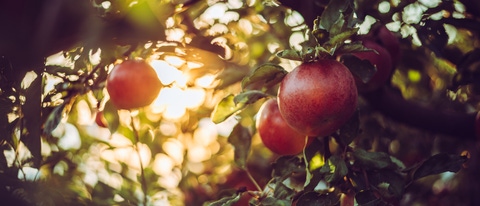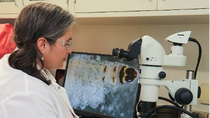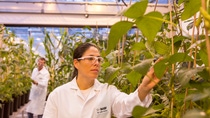Agriculture
Natural Partners: How BASF’s Biologicals Lead to More Sustainable Food Production
Biological crop protection is an important step forward to further support sustainable agriculture – and BASF plays a vital role with its BioSolutions portfolio. Being used as a complementary or an alternative to conventional crop protection products, biologicals not only help farmers meet society’s ever-growing demand of more sustainably grown food, but also enable healthy plants through natural partners, such as beneficial nematodes. Follow us on the journey and learn how biological crop protection works, how BASF is advancing its portfolio and why biologicals are one important tool of many that farmers need to protect their crops.

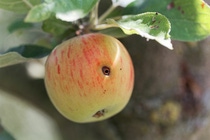
Although it is so small, the codling moth's caterpillar can break an entire apple harvest.
The codling moth: a serious problem for farmers
Just thinking about biting into an apple and finding a worm would make most people cringe. But for farmers, finding a single hole in an apple from their harvest can make or break their year.
In recent years, the codling moth and its fruit-eating caterpillar have become a serious problem for growers of apples and pears. The moths lay eggs on the trees, and those hatch into caterpillars that feed on the fruits. In the fall and winter, the caterpillars find a way to beat the cold weather and lack of food by burrowing into the soil and bark.
This makes them extremely difficult to control with any kind of crop protection. “Farmers tried out many different products to control the moths or fruit-feeding caterpillars. But none of them was suitable to fight overwintering caterpillars,” says Dr. Diana Londoño, who is working at Research Triangle Park, North Carolina, US, as Insect Researcher at BASF’s Agricultural Solutions division.
Left unchecked at this stage, populations of the insect become larger and harder for the farmer to control during the next season, leading to even more damaged fruit. “Entire containers of apples are destroyed if one hole is found because they would be rejected by consumers at the grocery store. Think of the amount of food wasted when these pests are not controlled.”

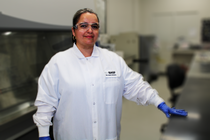
Dr. Diana Londoño in her lab in Research Triangle Park, North Carolina, United States.
Beneficial nematodes to the rescue
Diana is part of a team at BASF Agricultural Solutions that developed a biocontrol product that can get to these hard to reach caterpillars. From her lab in Research Triangle Park, Diana uses a stereomicroscope attached to a computer to look at microscopic worms called nematodes. The ones she has under magnification, Steinernema carpocapsae, are insect parasitic nematodes and are natural enemies of the codling moth caterpillar. They act as a living insecticide, feeding on the caterpillar in large groups and thereby making it harmless for fruits.
Biologicals are a complementary or an alternative solution to conventional crop protection products. BioSolutions by BASF are based on natural partnerships that benefit plant health, like fungi that form a shield of protection against plant pathogens. They can be beneficial nematodes, microorganisms, and pheromones that protect plants against insect pests. They could also be beneficial organisms formulated as seed treatments and inoculants that increase quality and yield in crops around the world.
When I was first reaching out to growers about these beneficial nematodes, they were worried that they’d leave residues, or they’d have to get new equipment. But we have developed our nematodes to be easy to use with the equipment the grower already has.
Diana Londoño has been working with farmers and biologicals for more than 20 years. “Growers can apply the product to the soil and the base of the tree trunk using their sprayer, and the nematodes seek out the codling moth larvae.” And this biological pest control option provides excellent control, effectively reducing insect numbers for the following year.
BASF has deep expertise developing natural partners for pest and disease control. To help meet the ever-growing demands of people and society for high quality food grown more sustainably, the company believes in finding the right balance between efficacy and sustainability. BioSolutions by BASF have a vital role to play in this. The company’s experts have been developing and formulating natural pest control and plant health options based on beneficial living organisms and nature-identical substances. And controlling caterpillars in apples is only one of their many application areas.

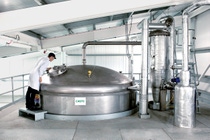
Just like microbes in beer, millions of beneficial nematodes are grown in huge vats like this.
What nematodes and beer have in common: Scaling up biopesticide production
Biologicals are natural partners, but in nature they are not found at population sizes needed to control agricultural pests. The beneficial nematodes that are the basis for Nemasys C®, for example, were isolated right from codling moth larvae as its natural enemy. But like traditional chemical crop protection products, the volume of biological pesticides has to be increased from the small amount that Diana needs in the lab for her experiments, to large-scale amounts that farmers could apply to protect their crops. “They’re living organisms and they need to eat. They’re not just going to stay sleeping there waiting for codling moths to overwinter. Our job is to get farmers these nematodes in higher quantities than found in nature, so that they can apply them when and where they have problems,” Diana says.
To scale up production of a living organism, BASF is relying on its expertise in chemistry. In this case, fermentation. The microscopic crop protection worms – the beneficial nematodes – can be grown at scale much like the microbes in beer: floating in a liquid full of nutrients. Inside the huge vats of liquid, the nematodes grow, mate and reproduce until there are millions ready to be pulled from the liquid, packaged and shipped to growers. BASF manufacturing experts in biological crop protection recently doubled their fermentation capacity, giving BASF one of the largest capacities in the world dedicated to production of beneficial nematodes.
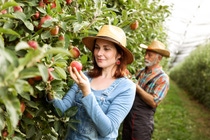
To support growers, BASF has R&D and production sites strategically located in more than ten countries around the world.
Being close to customers is key
Biologicals usually require different storage conditions than conventional pest control products. To keep them alive, most of them need to be refrigerated until use. To overcome this challenge, BASF has R&D and production sites strategically located in more than 10 countries around the world to support growers. These sites can safely deliver the living products to growers in shorter shipping times. For the growers that Diana works with, these storage conditions are nothing new. “Growers struggling with the codling moth are already using biologicals, a virus and Bacillus thuringiensis proteins that control other stages of the codling moth. Those need to be refrigerated, too. So, it is nothing very unusual for them.” Being close to customers also allows them to research and develop the most effective products for the uniquely challenging farming environments in each region.

Advancing biologicals as alternatives or complements to conventional crop protection
These beneficial nematodes are just one kind of natural pest control that the Agricultural Solutions team at BASF is developing in its BioSolutions portfolio. Just as beneficial nematodes can be developed for use as a bioinsecticide, BASF is also advancing fungi and bacteria that can also control pests and diseases or improve the nutrient availability around the plant.
One example of a BioSolution, Poncho® Votivo® 2.0, is a combination of two bacterial strains carefully applied to seeds. One creates a living barrier around the seed that prevents damage from harmful soil-dwelling bugs that would feed on the small, vulnerable roots of a young plant. The other is bacteria that increase the microbial activity around the root, resulting in an increase of available nutrients for the plant to use. Through its production of various beneficial bacteria applied to seeds, including these bacteria and inoculants, BASF is one of the largest producers of seed treatment biologicals globally.

Biological and conventional crop protection: strong together
But seedlings are faced with more threats than root-feeding insects and nutrient deficiency. Consider a soybean seed planted in the midwestern United States in the spring: it is destined to become cooking oil and protein for animal feed. But before that, the plant must compete with weeds for vital nutrients, and ward off damage from pest insects and disease across its two-to-three-month growth cycle – from seed to bean growth, to harvest. The farmer employs many strategies to protect the plant’s health during this time and, when possible, products formulated together are more efficient at protecting the plant and simplify farming operations. BASF combines the biological seed treatment with a conventional insecticide, adding protection from both below ground and above ground insects as the plant absorbs it through its roots. The combined biological and conventional seed treatment can be applied to seeds with protective native and biotechnology-introduced traits so that plant health is further buffered from environmental pressures like insect pests, weeds, diseases and climate challenges. Biological and conventional crop protection connections will allow for enough healthy food to be produced even more sustainably.
New partnerships: crucial to meet the growing demand for biologicals
Although biological pest and disease control has been around for centuries, this sector has been rapidly expanding of late, driven by the need to reduce the impact of farming on the environment and benefitting from R&D advances in biology and production. By partnering with companies, start-ups and universities that already have technologies on or are close to market, BASF wants to speed up the process of getting biological solutions to farmers. BASF is looking for innovative partnerships, like the recently announced cooperation with AgBiome, to help meet the growing need and demand for biological solutions in agriculture.
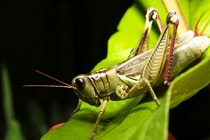
Locust plagues can break entire harvests, for example in Australia.
Biologicals are part of the solution for sustainable food production
As promising as the future is for biologicals, some of the very things that make them desirable also contribute to their limitations. Many of the beneficial nematodes and microbes developed as a biocontrol have ranges of temperature and humidity where they thrive. Because they are living organisms, they don’t perform well in extreme heat or cold, or in too-dry or too-wet conditions. Unfortunately, farmers are challenged with these extreme weather events frequently in growing food crops and, therefore, still need options for pest control through these conditions. Biologicals work well to prevent pest outbreaks but the weather conditions of some years will inevitably favor the rapid growth of pest populations. This is the case of the plague locust damage to food supplies in Australia. In describing the obstacles to the wider use of biological pest control in the case of pest outbreaks, the FAO says that biological pesticides “can’t replace conventional sprays”. But the same can be said about any tool used alone. That is why BASF is developing multiple strategies that farmers can use to secure the demand for food in addition to its BioSolutions portfolio: chemical crop protection, seeds with native or biotech traits for pest resistance, and digital, precision solutions.
We can never become too reliant on one tool. Take the codling moth. There are many forms of control, including biologicals, yet the codling moth still naturally develops resistance.
The good news is that through continuous innovation, these tools can be altered to overcome resistance and new solutions are discovered that protect plant health – and that is the work of the R&D teams at BASF Agricultural Solutions.

